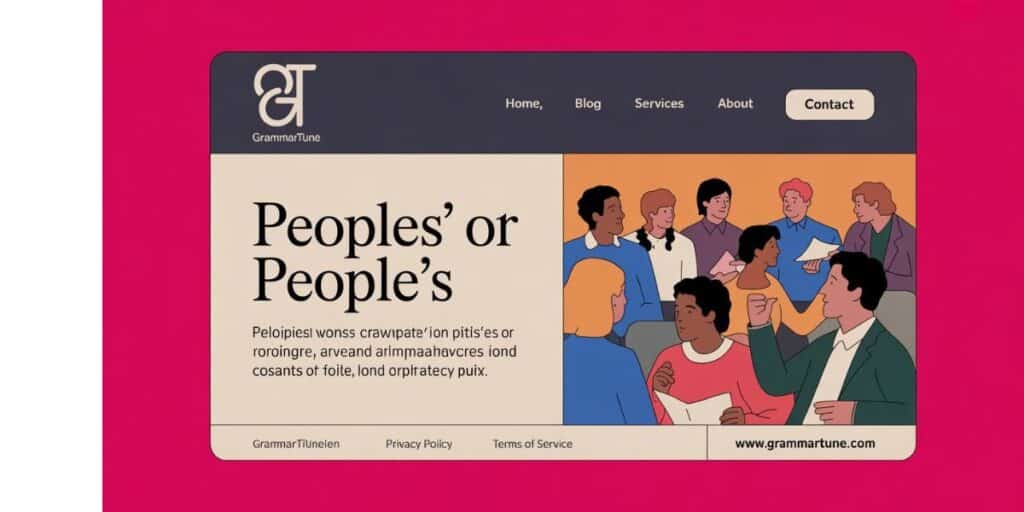Ever wondered which is correct — people’s or peoples’? These tiny punctuation marks can completely change meaning. Let’s break down the possessive forms of people and peoples so you never second-guess again.
People vs. Peoples
Is it People or Peoples?
The choice between people and peoples hinges on context. People is the plural form of person, referring to a group of individuals. Peoples, however, is used to denote multiple distinct ethnic groups or nations.
Must read: Understanding the Past Tense of ‘Putting’: Is it ‘Put’ or ‘Putted’?
People
Use people when referring to a group of individuals collectively. For example:
- “The people gathered in the square to celebrate.”
Peoples
Peoples is appropriate when discussing multiple distinct groups, often with unique cultures or languages. For instance:
- “The peoples of the Amazon have diverse traditions.”
People vs. Peoples for Ethnic Groups and Nationalities
- Peoples signify different ethnic groups or nationalities stressing their distinct existence.
- For example:Some say that human beings belong to many races, and some acknowledge that Africans are those first and foremost in laying claim to a situation in contradistinction to the other. But the peoples of Africa surely have a lot of cultural heritage.
You will like: Follow Up or Follow-Up: Which Spelling to Use?
Persons, People, or Peoples?
- Persons is used to refer to individuals mostly in legal and formal terms.
- People is the general plural of person.
- Peoples refers to multiple distinct groups with unique identities.
Examples in Use
Example in Sentences: People
- “The people of the city voted in the election.”
- “Many people enjoy reading books.”
The Examples: Peoples
- “The peoples of the world should work towards peace.”
- “Indigenous peoples have unique traditions.”
Examples of Sentences with People’s
- “The people’s voices were heard in the meeting.”
- “The people’s decision was final.”
Examples of Sentences with Person’s
- “Each person’s opinion matters.”
- “The person’s belongings were found.”
Possessive Forms and Apostrophe Rules
The Apostrophe Rule for Possessives
Understanding how to form possessives is crucial:
- Singular Possessive:Add an apostrophe + s to an isolated noun.
- Example: “The person’s book.”
- Example: “The person’s book.”
- Plural Possessive:When the plural noun ends with “s,” simply an apostrophe is added to the end.
- Example: “The cats’ toys.”
- Example: “The cats’ toys.”
- Irregular Plural Possessive:Whenever an irregular plural does not end in s, the possessive is formed by the addition of an apostrophe and s.
- Example: . .”the playground for children.”
Peoples’ or People’s: The Difference
- People’s: Used for something belonging to a group of people.
- Example: “The people’s rights were protected.”
- Example: “The people’s rights were protected.”
- Peoples’: Used when referring to something belonging to multiple distinct groups.
- Example: “The peoples’ languages are diverse.
- Example: “The peoples’ languages are diverse.
People’s
- The possessive form of people denotes ownership or association. Example: “The people’s choice was unanimous.”
Peoples’
- The possessive form of peoples used to indicate ownership or association between different peoples. Example:Example: “The peoples’ traditions have a very wide range”.
Person’s
- That person’s made-of-a-type word which conveys possession or association as an example is “final was the person’s choice.”.
Possessive Nouns: Summary
| Noun | Possessive Form |
| Person | Person’s |
| People | People’s |
| Peoples | Peoples’ |
People vs. Persons
People vs. Persons as Plurals
- People is the common plural of person.
- Persons is used in formal or legal contexts to refer to individuals.
Persons or People in Formal Legal Writing
In legal writing, persons are often preferred to ensure clarity and formality.
- Example: “Only authorized persons may enter.
You will like: What’s the Plural of Axe? Is it Axes or Axen?
Conclusion
Choose between peoples’ or people’s according to the situation. Use people’s when something pertains to a general collection of individuals, like “the people’s voice.
When referring to specific groups, peoples’ is appropriate, as exemplified by “the peoples’ customs.” Get the apostrophe wrong, and you’re left with a completely different meaning; therefore, the distinction is something to take very seriously.
The choice of peoples’ versus people’s is a mark of clarity, precision, and professionalism all the way through, whether in informal writing or in a more scholarly tone.
FAQ,S
Is “peoples” grammatically correct?
Yes, use peoples to refer to multiple distinct ethnic or national groups.
What’s the difference between people’s and peoples’?
People show possession by one group; peoples’ refers to possession by several distinct groups.
Can “persons” be used instead of “people”?
Yes, but only in formal or legal contexts.
How do you make “people” possessive?
Add ’s: “The people’s opinions mattered.”
When should I use “peoples’”?
When referring to things belonging to multiple ethnic groups: “The peoples’ cultures differ.”

Joulia, a seasoned wordsmith and grammar enthusiast, brings over a decade of blogging expertise to Grammar Tune. With a keen eye for linguistic precision and a passion for making complex grammar concepts accessible, he has helped thousands of readers enhance their writing skills. His engaging teaching style and practical approach to language learning have made him a trusted voice in the online grammar community.







